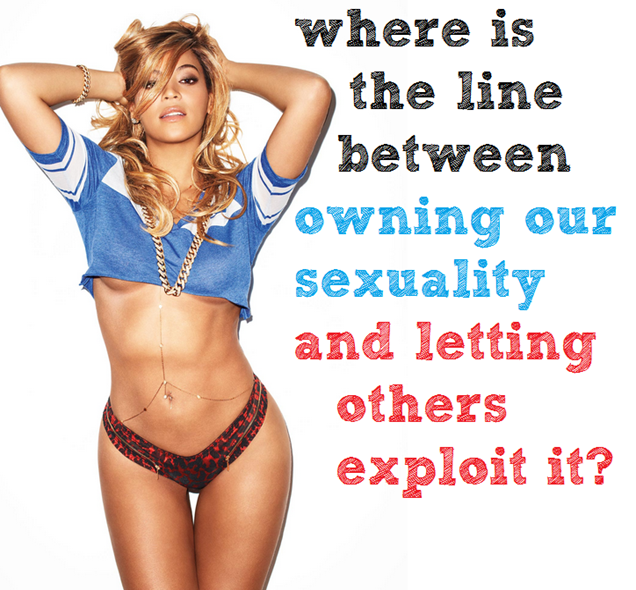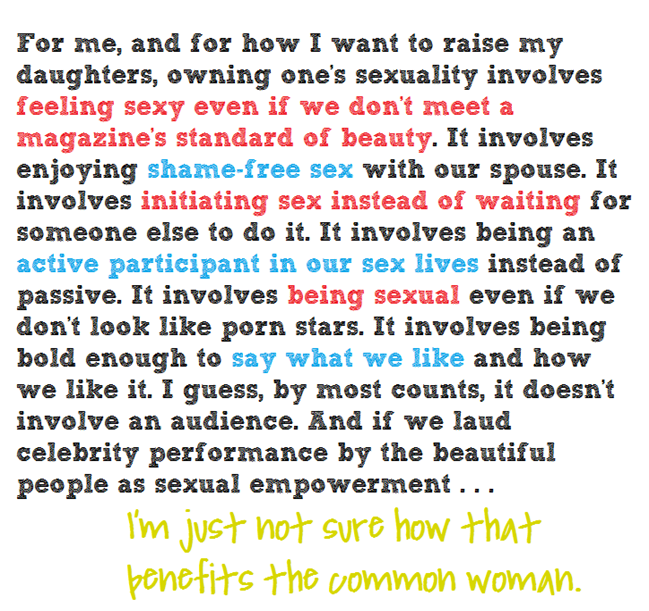Like many Americas, I watched the Superbowl on Sunday while perusing the internet, and witnessed a variance of reactions to both the ads and the halftime show. Beyonce’s performance has sparked quite the national conversation, both in the secular and Christian blogosphere. I saw a wide range of opinions, from people who loved her performance to those who thought it to be too risqué, from some who viewed it as a show of female empowerment to others who thought she was a conduit of Satan himself. (Yes, really).  Here are a few of the varied reactions I saw:
Here are a few of the varied reactions I saw:
“Are we really going to pretend Beyonce does all that because she’s in control and doing whatever she wants, or is it also because that’s what every women who’s a star has to do to stay relevant and stay on the magazine covers and be in the news? “All I’m saying is if Beyoncé wanted to crush my head between her thighs, I wouldn’t mind.” “Fabulous ! That’s a performer! Beyonce killed it at the Super Bowl! Girl power all the way!” “I stand for purity. Physically and mentally. Beyonce stands for sexual promiscuity. Yes, I will stand AGAINST her.” “I wonder if there will be a time when people will not be threatened by women who don’t give an actual damn.” “I don’t think we can have it both ways… When we talk about the negative hypersexuality our young girls are bombarded with, that warps their self-image of what a young woman should be, the performance she gave is a part of that very big problem.”
In addition to facebook banter, several folks wrote blog posts about the performance, with again, a wide spectrum of opinions. David Henson, in the post A Defiant Dance of Power, Not Sex: Beyoncé, the Super Bowl and Durga, saw her performance as a display of power. “Because Beyoncé’s performance Sunday night in New Orleans wasn’t about sex. It was about power, and Beyoncé had it in spades. In fact, her show was one of the most compelling, embodied and prophetic statements of female power I have seen on mainstream television. That a Black woman claimed and owned her power during the misogynist, consumerist celebration known as the Super Bowl only highlights Beyoncé’s brilliance and boldness. It’s no wonder some people attempted to wrest back control over her and her body by marginalizing her performance by sexualizing it. Was Beyoncé attractive, sexy even? To be sure. But more than anything, she was powerful. Few things are more threatening to a male audience than a beautiful, powerful woman who doesn’t need a man, or even a male gaze.” Haley KC wrote a rebuttal to David’s piece, saying, “As Audre Lorde said, as she railed against the racism she saw within the feminist movement, “The master’s tools will never dismantle the master’s house. They may allow us temporarily to beat him at his own game, but they will never enable us to bring about genuine change. And this fact is only threatening to those women who still define the master’s house as their only source of support.” Please, please hear me when I say this: You cannot use the tools of those in power to dismantle that same power structure. It does not work.” My friend Joy, in a post entitled Beyonce, the Superbowl Halftime Show, and Evangelical Attitudes about Human Sexuality, asked, “Is this a manifestation of the modesty wars, in which women are made responsible for men’s lust? Is this our societal discomfort with strong women? Or does this rise from a deep-seated Gnosticism* that views all that is physical to be evil? Perhaps evangelical views of sexuality are heavily influenced by this heresy?” In contrast, Christena Cleveland pushed back against the “power” notion in the post Hello Sexism, Meet Racism: Intersectionality and the Super Bowl Half-time Show: “As “powerful” as she appeared on stage, Beyonce was still subject to the stringent rules and standards that white men set for black women. All other things (e.g., talent) being equal, she was only given “power” because she happens to be the kind of black woman that white men like and because she was sure to “perform” in a way that would be pleasing to them. To be blunt, she was treated like a 21st century “house nigger” whose value will never outlast the duration of an erection. I’ll cheer whole-heartedly when black women get the Super Bowl stage on our own terms. Until then, I’m ambivalent.” Many of the reactions have cast Beyonce as either sinner or saint, and I guess I’m sitting somewhere in the middle. I thought Beyonce was a powerhouse of confidence and stamina. I liked the performance. At the same time I would agree with one premise of Haley’s piece: I’m leery of women framing“taking control of our sexuality” as something that looks an awful lot like the ways our sexuality is exploited. Personally, I did think the dancing was intentionally provocative, but I expected as much from Beyonce, and from the history of halftime shows that featured female performers, so I wasn’t exactly clutching my pearls. As my friend Nish astutely pointed out, this has been going on for years and we’ve got to relinquish the idea that the Superbowl is a family-friendly show. We watched it with the kids but with heavy editing via the remote during commercial breaks, and many of the commercials were clearly sexist. I think what makes the conversation surrounding Beyonce so fascinating is that people interpret it so many different ways. Our kids like Beyonce’s music so we let them watch for a few minutest but I did turn it off mid-performance. I turned it off not because I was offended, and not because I was worried about my husband or sons seeing a sexy woman, but because I didn’t want my daughters thinking that’s how powerful women need to behave. (And, to be honest, I didn’t relish the idea of them mimicking her moves on the playground the next day). I shut it off at the point where she suggestively licked her finger and then traced it down her breast. So when people say it wasn’t overtly sexual, I feel like maybe we were watching different things. She rocked that choreography but there was still plenty of the down-on-her-haunches crotch-flashing moves that felt very intentionally sexual to me, and certainly purposeful in terms of enticing the “male gaze”. So do I think all of that lends to dismantling the objectification of women? Especially in the middle of a male-dominated sport? No. I don’t. And while I’m not outraged, I don’t know that I’d call her performance about “power”. I still think she’s a female entertainer who, in order to make it, has had to display her sexuality even more than her talent. To me, power would be her showing up wearing as much clothing as Usher or Bruno Mars, dancing without overt reference to sex like finger-licking or crotch-flashing, and still getting as much accolade for it. I don’t think that it’s a “feminist win” that women need to wear corset-inspired leotards or that black women have to wear blonde extensions to conform to white beauty standards, and I certainly don’t think Beyonce is a picture of female empowerment. I think she’s a highly manufactured pop star who relies heavily on a sexed-up image to sell records. When female entertainers can act/dress/focus on talent like the men can, and sell as many albums, I would call it a win. I don’t say this exclusively about Beyonce, but she is the one on stage this week. At the end of the day, I’m intrigued by the discussion surrounding Beyonce, and I think it’s a good thing. This certainly isn’t the first time we’ve had a sexualized half-time show, so it is curious that there is so much conversation this year. I can’t help that maybe it’s because a contingency of people are getting sick of women having to play this predictable role. (And while I acknowledge that sometimes men behave provocatively onstage, I don’t believe it’s as consistent or expected of their gender).  I think it’s valuable to begin asking: Where is the line between “owning your sexuality” and “being a cog in the wheel of a ‘sex sells’ industry”. It sounds like some viewed Beyonce’s performance in the former. For me, her performance was the latter – reminiscent of performances by Britney Spears, Madonna, Miley Cyrus, and any other number of pop stars who seem almost required to behave the same way to stay in the game, while none of this is required of men. And while we may not all agree on this particular performance, what about posing in her underwear on the cover of GQ to promote the halftime show? Is that “owning her sexuality” or is that her giving in to the demands of a misogynistic music industry? I’ve watched many pop stars and actresses bend to the pressure of posing for men’s magazines. Are these women owning their sexuality by posing for a magazine targeting men? I’m not sure I buy that. Ultimately, I think I’m wary of attributing any kind of commercial performance or photo shoot as an act of female empowerment or ownership of sexuality.
I think it’s valuable to begin asking: Where is the line between “owning your sexuality” and “being a cog in the wheel of a ‘sex sells’ industry”. It sounds like some viewed Beyonce’s performance in the former. For me, her performance was the latter – reminiscent of performances by Britney Spears, Madonna, Miley Cyrus, and any other number of pop stars who seem almost required to behave the same way to stay in the game, while none of this is required of men. And while we may not all agree on this particular performance, what about posing in her underwear on the cover of GQ to promote the halftime show? Is that “owning her sexuality” or is that her giving in to the demands of a misogynistic music industry? I’ve watched many pop stars and actresses bend to the pressure of posing for men’s magazines. Are these women owning their sexuality by posing for a magazine targeting men? I’m not sure I buy that. Ultimately, I think I’m wary of attributing any kind of commercial performance or photo shoot as an act of female empowerment or ownership of sexuality.  What are your thoughts? Did you find the performance offensive, empowering, neutral, or predictable? What do you make of the conversation around it?
What are your thoughts? Did you find the performance offensive, empowering, neutral, or predictable? What do you make of the conversation around it?
